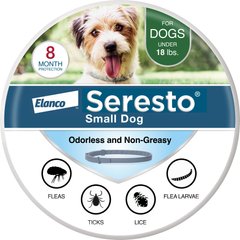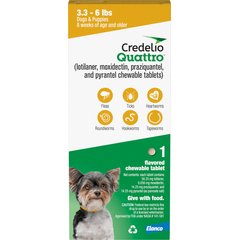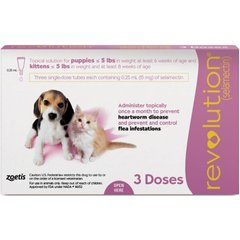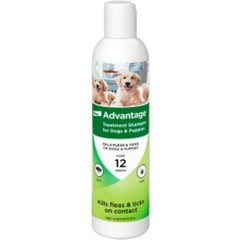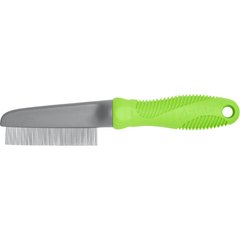A Guide to Flea and Tick Prevention for Puppies

Photo by SolStock/E+ via Getty Images
While you and your puppy are beginning to form an unbreakable bond with plenty of playtime and cozy cuddles, the last thing you might want to think about are parasites. But it’s crucial to prevent the likes of fleas and ticks early on to help keep your best furry friend free of them and, ultimately, healthy and happy for years to come.
We spoke with veterinarians about flea and tick prevention for puppies, including the importance of preventive care, signs your pup may have fleas or ticks, how to treat fleas and ticks on puppies, and more.
Key Takeaways
- Most flea and tick preventives are safe for puppies starting around 8 weeks old.
- The best preventives include oral chews, topical treatments, and collars, with the right choice depending on the puppy’s age, weight, and lifestyle.
- Regular treatments, careful monitoring for side effects, and consulting a veterinarian ensure safe, effective flea and tick protection tailored to a puppy’s unique needs.
The Importance of Tick and Flea Prevention for Puppies
Ticks and fleas are small, pesky pests that can pose big, serious problems for pups.
Starting your puppy on flea and tick prevention early is important for several reasons:
- Health protection: “Fleas and ticks aren’t just annoying—they can transmit serious diseases like Lyme disease, ehrlichiosis, and tapeworms,” says Wayne M. Johnson, VMD, veterinarian at Birdneck Animal Hospital in Virginia Beach, Virginia. “Preventing these pests keeps your puppy safe from these health risks.”
- Comfort: Flea bites cause unpleasant symptoms, like itching, redness, and allergic reactions, while ticks can cause irritation and discomfort, Dr. Johnson explains. By keeping these pests away, you can keep your puppy comfortable and happy.
- Long-term benefits: Regular prevention eliminates the possibility of infestations that can lead to more serious health issues down the line, Dr. Johnson says. Not only that, but it also saves you the hassle and cost of tackling a flea or tick problem in your home.
When Can Puppies Start Flea and Tick Prevention?
Most flea and tick preventives can be started when a puppy is around 8 weeks old, Dr. Johnson says. However, the minimum age (and minimum weight requirements) may vary depending on the product and can be found on the label.
“It’s best to start flea and tick prevention as soon as your puppy leaves the breeder or shelter,” Dr. Johnson says. “This ensures they’re protected from day one, especially if they’re going to be outdoors or around other animals.”
Always consult with your veterinarian before starting any new medication to make sure it’s safe and appropriate for your puppy’s age, weight, and health status. Your vet will be able to recommend the best timing and approach.
4 Types of Flea and Tick Treatments for Puppies

Svetlana Parnikova/iStock/Getty Images Plus
There are a few methods you can use to repel and combat fleas and ticks. Of these methods, there are various products to choose from to best accommodate your puppy’s needs and your budget.
Our experts break down the different types of flea and tick medications and methods, as well as their benefits and drawbacks:
1. Flea and Tick Collars
A flea collar is worn just like a regular collar, except it slowly releases active ingredients over time to repel or kill fleas and ticks.
Flea and tick collars provide protection anywhere between six to eight months. For example, Seresto kills and repels fleas and ticks for eight continuous months. Odorless and non-greasy, this vet-recommended collar does not require a prescription and is formulated for dogs and puppies 7 weeks old and up.
Recommended Product
Collars are convenient, long-lasting, and offer constant protection, Dr. Johnson says. However, they need to be properly fitted to be effective and safe.
Some puppies might find collars to be uncomfortable or try to chew them, which could lead to choking hazards, irritations, or even injury if the collar gets caught on something. Additionally, constant chewing could weaken the collar, reducing its effectiveness.
Also, flea collars may not be as effective as other methods for severe infestations.
2. Prescription Pills and Chews
Available in wag-worthy flavors, prescription pills and chews are often recommended for their systemic action and work by entering the bloodstream and killing fleas or ticks upon biting, says Bethany Hsia, DVM, mobile veterinarian and co-founder of CodaPet, in Clovis, California.
These are typically given once a month and may protect against a broad range of parasites, depending on the product. For example, a single dose of Credelio Quattro protects against fleas, ticks, heartworms, tapeworms, roundworms, and hookworms for one month.
Recommended Product
Dr. Johnson considers prescription pills and chews to be effective and convenient, as they tend to kill fleas and ticks quickly and are easy to administer.
However, depending on how long they last, they must be given on time and regularly to work effectively. While these products are generally tolerated well, common side effects can include GI upset, lethargy, or loss of appetite.
“Vets may suggest these options for puppies who are at least 8 weeks old and weigh enough to safely receive the medication,” Dr. Hsia says.
3. Topical Flea and Tick Treatments
Topical solutions, like Revolution, are applied directly to the skin and generally offer protection for up to one month against fleas and ticks. Some also prevent flea eggs from hatching.
Recommended Product
Topical treatments are easy to apply and provide continuous protection with a single application, Dr. Johnson says. Some topical treatments can also protect against heartworms and other parasites.
In some cases, however, topical treatments can be messy and stain your puppy’s fur, he says. And, if not applied correctly, they may be ineffective against fleas and ticks. Additionally, topical treatments may cause skin reactions if your puppy has sensitive skin.
Topical treatments may be recommended for puppies who might not tolerate oral medications well, Dr. Hsia says.
4. Flea and Tick Shampoos
Using flea and tick shampoo for puppies is another way to help keep them free from these parasites.
For example, Advantage Flea and Tick Shampoo can be used for puppies over 12 weeks old and can kill fleas and ticks on contact. In general, flea shampoos should be used only once a week. Always make sure you double-check the species the shampoo is labeled for—never use a puppy product on a kitten or vice versa.
Recommended Product
During or after your pooch’s bath, use a flea comb to remove any fleas that may still be on them.
Recommended Product
Dr. Johnson considers flea shampoos to be good for getting rid of existing parasitic pests and great for puppies who can’t take medications.
While they do have their benefits, Dr. Johnson says they don’t provide long-term prevention and are not as effective at preventing future infestations compared to other methods. So year-round flea and tick prevention are still recommended.
Flea and Tick Prevention Tips for Puppies
Dr. Johnson shares the following tips on flea and tick treatment for puppies:
- Consistency is key. Whatever method you choose, make sure to stick with it consistently, as directed, to keep your puppy protected.
- Consult your vet. Always talk to your vet first before applying any treatment and to determine the best option that’s tailored to your puppy’s specific needs.
- Monitor for reactions. Keep an eye on your puppy after starting any new treatment to catch any adverse reactions early. If an adverse reaction occurs, seek your vet’s advice on whether to discontinue use or switch to an alternative treatment.
“By staying proactive with flea and tick prevention, you’re ensuring a healthier, happier life for your puppy,” he says. “If you have any more questions or need personalized advice, your vet is always the best resource.”
Signs Your Puppy May Have Fleas or Ticks

Wirestock/iStock/Getty Images Plus
Being able to detect flea and tick warning signs in your puppy is important. That way, you can get them started on a treatment that’s right for them and keep them safe and protected year-round.
If these blood-sucking parasites make their way onto your pup, certain signs and symptoms will make their pesky presence known. These can include:
- Scratching or biting
- Dark brown specks on fur, aka flea dirt
- Dark spots in bedding
- Tapeworms on bedding or around their anus or feces
- A small bump on the skin
- A bullseye-like bite
- Scabs or raised lesions
- Excessive grooming
- Hair loss
- Restlessness
- Hot spots
- Lethargy
- Muscle loss
- Pale gums
- Paralysis
How To Get Rid of Fleas on Puppies
If you notice signs of fleas or ticks on your little buddy, it’s best to take immediate action, Dr. Hsia says. She recommends the following steps to eliminate these pests:
- Bathe your puppy using a vet-recommended flea shampoo to help kill adult fleas on contact.
- Use a fine-toothed flea comb to remove adult fleas and their eggs from their fur.
- Wash all bedding, toys, and any areas where the puppy spends time in hot water to eliminate any remaining pests.
Vets may treat existing fleas and ticks with systemic treatments, like prescription medications that kill adult fleas quickly, or make recommendations for ongoing flea control products tailored to your puppy’s age and weight, Dr. Hsia adds.
FAQs About Flea and Tick Prevention for Puppies
What flea and tick treatment is safe for puppies?
Many oral and topical medications as well as Seresto collars are often safe for puppies at 7–8 weeks of age. Be sure to consult the product label carefully for the appropriate weight and age. Your vet can also help guide you to the best product for your pup.
Are flea and tick collars safe for puppies?
Seresto collars can be used on puppies 7 weeks of age and up. Talk to your vet to see if they think this flea and tick collar is a good option for your pup.
Can I use a homemade flea shampoo for puppies?
It is best to use a flea shampoo specifically formulated for puppies. Also remember to never use a puppy product on a kitten or vice versa. Our vets’ pick for best flea and tick shampoo for puppies is Advantage Flea & Tick Treatment Shampoo for Dogs & Puppies.
